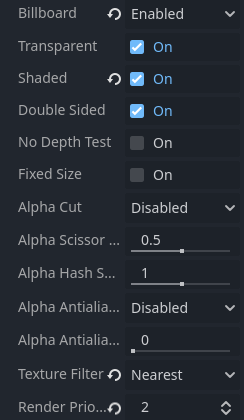Godot Version
4.2.2
Question
I’ve ran into a problem with the pixel highlight shader I have in my game which was caused by me trying to change another problem and now I’m stuck in a crossroad.
Here is my current scene tree:

First scenario I set the alpha cut to discard:

The character has two highlights which is not good
But the sprite is obscured by the wall perfectly and has depth.
The other scenario is that I set the alpha cut to disabled:

The sprite has the one outline in the texture itself which is what is wanted.
But going behind a wall has no depth so it looks very strange.
Another screenshot to show how this is a problem. He is the wall now…

I’m new to Godot so I took the highlight shader code from the video
“Godot 4 Post Processing: 3D Pixel Art Shader” by Crigz Vs Game Dev on Youtube, and I’ve spent an hour trying to solve the problem myself but I got nowhere.
Here is the pixel highlight shader code:
shader_type spatial;
render_mode unshaded;
uniform sampler2D screen_texture : source_color, hint_screen_texture, filter_nearest;
uniform sampler2D depth_texture : source_color, hint_depth_texture, filter_nearest;
uniform sampler2D normal_texture : source_color, hint_normal_roughness_texture, filter_nearest;
uniform float depth_threshold : hint_range(0, 1) = 0.05;
uniform float reverse_depth_threshold : hint_range(0, 1) = 0.25;
uniform float normal_threshold : hint_range(0, 1) = 0.6;
uniform float darken_amount : hint_range(0, 1, 0.01) = 0.3;
uniform float lighten_amount : hint_range(0, 10, 0.01) = 1.5;
uniform vec3 normal_edge_bias = vec3(1, 1, 1);
uniform vec3 light_direction = vec3(-0.96, -0.18, 0.2);
float get_depth(vec2 screen_uv, mat4 inv_projection_matrix) {
float depth = texture(depth_texture, screen_uv).r;
vec3 ndc = vec3(screen_uv * 2.0 - 1.0, depth);
vec4 view = inv_projection_matrix * vec4(ndc, 1.0);
view.xyz /= view.w;
return -view.z;
}
void vertex() {
POSITION = vec4(VERTEX, 1.0);
}
void fragment() {
float depth = get_depth(SCREEN_UV, INV_PROJECTION_MATRIX);
vec3 normal = texture(normal_texture, SCREEN_UV).xyz * 2.0 - 1.0;
vec2 texel_size = 1.0 / VIEWPORT_SIZE.xy;
vec2 uvs[4];
uvs[0] = vec2(SCREEN_UV.x, min(1.0 - 0.001, SCREEN_UV.y + texel_size.y));
uvs[1] = vec2(SCREEN_UV.x, max(0.0, SCREEN_UV.y - texel_size.y));
uvs[2] = vec2(min(1.0 - 0.001, SCREEN_UV.x + texel_size.x), SCREEN_UV.y);
uvs[3] = vec2(max(0.0, SCREEN_UV.x - texel_size.x), SCREEN_UV.y);
float depth_diff = 0.0;
float depth_diff_reversed = 0.0;
float nearest_depth = depth;
vec2 nearest_uv = SCREEN_UV;
float normal_sum = 0.0;
for (int i = 0; i < 4; i++) {
float d = get_depth(uvs[i], INV_PROJECTION_MATRIX);
depth_diff += depth - d;
depth_diff_reversed += d - depth;
if (d < nearest_depth) {
nearest_depth = d;
nearest_uv = uvs[i];
}
vec3 n = texture(normal_texture, uvs[i]).xyz * 2.0 - 1.0;
vec3 normal_diff = normal - n;
// Edge pixels should yield to the normal closest to the bias direction
float normal_bias_diff = dot(normal_diff, normal_edge_bias);
float normal_indicator = smoothstep(-0.01, 0.01, normal_bias_diff);
normal_sum += dot(normal_diff, normal_diff) * normal_indicator;
}
float depth_edge = step(depth_threshold, depth_diff);
// The reverse depth sum produces depth lines inside of the object, but they don't look as nice as the normal depth_diff
// Instead, we can use this value to mask the normal edge along the outside of the object
float reverse_depth_edge = step(reverse_depth_threshold, depth_diff_reversed);
float indicator = sqrt(normal_sum);
float normal_edge = step(normal_threshold, indicator - reverse_depth_edge);
vec3 original = texture(screen_texture, SCREEN_UV).rgb;
vec3 nearest = texture(screen_texture, nearest_uv).rgb;
mat3 view_to_world_normal_mat = mat3(
INV_VIEW_MATRIX[0].xyz,
INV_VIEW_MATRIX[1].xyz,
INV_VIEW_MATRIX[2].xyz
);
float ld = dot((view_to_world_normal_mat * normal), normalize(light_direction));
vec3 depth_col = nearest * darken_amount;
vec3 normal_col = original * (ld > 0.0 ? darken_amount : lighten_amount);
vec3 edge_mix = mix(normal_col, depth_col, depth_edge);
ALBEDO = mix(original, edge_mix, (depth_edge > 0.0 ? depth_edge : normal_edge));
}
Any help is appreciated. Thanks!



